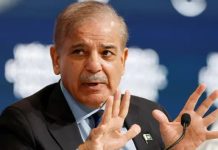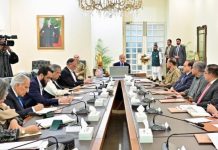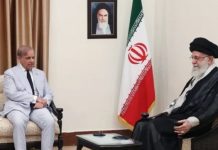ISLAMABAD, Feb 20 (APP):Federal Minister for Petroleum Dr. Musadik Malik on Thursday underscored the transformative impact of technological advancements on Pakistan’s energy sector, revealing that a single innovation has led to a 10,000-barrel increase in the Oil and Gas Development Company Limited (OGDCL)’s oil production.
Addressing a celebration event organized by OGDCL and Schlumberger, he said that if four more companies adopt similar technological advancements, Pakistan may no longer require International Monetary Fund (IMF) programs for financial stability.
He further highlighted that $250 million worth of innovation has been introduced in the sector, marking the beginning of a silent revolution driven by cutting-edge technology.
Praising Schlumberger for its exceptional contributions to the energy sector, the minister said that Pakistan is transforming, with key changes being implemented across various industries, including energy.
He outlined three major initiatives in the energy sector: indigenization, electrification, and deregulation. “We are focusing not only on energy but on broader economic reforms,” he explained.
He elaborated on these initiatives, stating, “Indigenization aims to produce locally what is currently being imported. Electrification involves integrating all energy sources—including renewables, green, blue, and brown energies—into a unified system, aligning with the global shift towards electric power.”
He stressed that the most significant shift is deregulation and the promotion of the private sector. Citing international models, he said that major firms worldwide foster innovation by integrating research, technology, commercialization, and academia. “When this innovation reaches OGDCL, the silent revolution we have been discussing becomes visible,” he added.
The minister highlighted the Prime Minister’s mandate to eliminate unnecessary regulations hindering business and economic activity. “We have seen how people struggle for months, sometimes years, to obtain approvals for petrol stations and small industries. Under the PM’s plan, only essential regulations will remain, and the rest will be scrapped,” he added.
He explained that rather than identifying regulations for removal, the approach is to define four essential rules for each economic activity, with all other regulations eliminated. “This is how deregulation will drive the economy forward,” he said.
The Minister said that downsizing efforts are underway in the petroleum sector under the Prime Minister’s directives. A special committee is scrutinizing government institutions, assessing their workforce requirements and relevance. “The government is reviewing its institutions to evaluate their efficiency, with a strong focus on outcomes rather than bureaucratic hierarchies,” he said.
He reaffirmed the government’s commitment to prioritizing public welfare, ensuring that all programs serve the interests of citizens rather than bureaucratic structures.
Criticizing the Pakistan Tehreek-e-Insaf (PTI) for launching international campaigns against Pakistan, he questioned, “Who asks the IMF not to support their own country? Who wants their own nation to go bankrupt? Who launches protest when institutional heads visit abroad ? When you pass resolutions abroad, they do not mention any political party; they target Pakistan itself.”
He strongly condemned actions aimed at destabilizing Pakistan’s economy, warning against moves that could harm the country’s financial stability and international credibility.
Highlighting economic improvements, Dr. Malik stated that inflation has dropped from 40% to 3%, while interest rates have declined from 24%, making borrowing easier for businesses. “When interest rates drop, companies can invest, hire more workers, and introduce innovations. This creates jobs for Pakistani engineers and strengthens industries,” he explained.
The minister urged for a constructive national debate centered on economic growth rather than political hostility.
“Pakistan’s progress should not be sacrificed for political rivalry. Reforms are underway, and the country is moving towards economic stability—but some are too focused on creating chaos to acknowledge these changes,” he added.

















